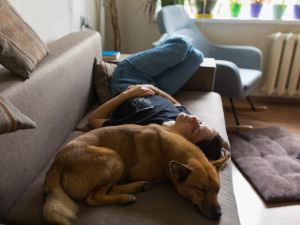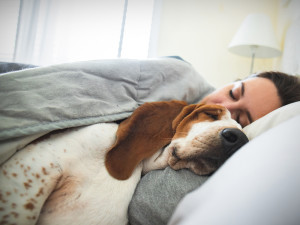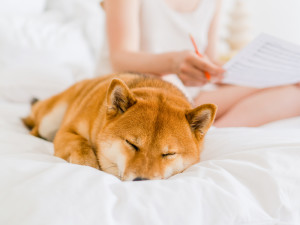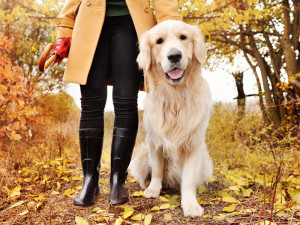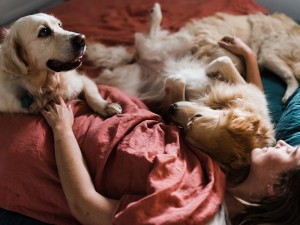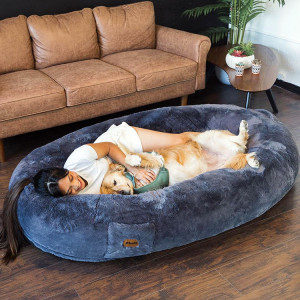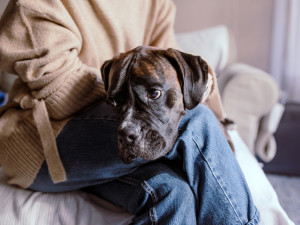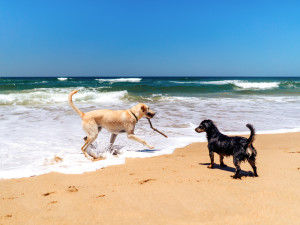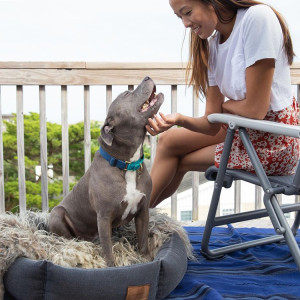
Share Article
In This Article:
Dog Sleeping Positions What Does It Mean When Dogs Sleep on Their Back?
Have you ever caught your dog sleeping on their back, paws up in the air, looking utterly content and relaxed? While it might seem like an odd or even amusing position, there are actually several reasons why dogs choose to sleep this way.
Sleep serves an important role in your dog’s happiness and wellbeing: It supports physiological, cognitive, and behavioral functions. Research shows that sleep habits in dogs can affect their aggression, hyperactivity, and impulses.
Dog sleeping positions
Besides sleeping on their back, there are five other main sleep positions. A calm and content dog may sleep on their side. Yet when it’s cold out, you may notice your dog sleeping in a donut position; this allows a dog to trap their body heat and stay warm. A dog who may want to stay alert while sleeping may be in a sphinx pose, this pose helps them be ready to jump up at a moment’s notice.

Certain breeds may sleep with their back and front legs outstretched like Superman; this pup may have a lot of energy and always be on the go when not asleep. Then there’s the cuddlebug, a dog who loves to snuggle with you to sleep. That is one affectionate pup.
What does it mean when dogs sleep on their back?
Have you caught your dog sleeping belly-up on their back? There are a few reasons why they may sleep like that.
Temperature regulation
One reason may be that they are feeling hot. Is the sun shining in the window, is it summertime? Your dog may snooze on their back to cool off. Typically, fur on a dog’s belly is the thinnest, so they may lay belly up to help let some cool air bring down their body temperature. Did you know dogs sweat from their paw pads? This may be another reason why you may find your dog belly up. This allows their paws to be up in the air helping cool them down.
Submission
Dogs communicate with other dogs using body language, when you see a dog flip over on their back while interacting with another dog they are saying, “Don’t hurt me.” A more submissive or formerly abused dog may roll on their back to show a human they are not a threat.
Pressure relief for joints and muscles
If your pup has muscles or areas of their body that feel sore or are injured, they might want to lie on their back to relieve pressure from where they feel pain. An older dog may lie on their back if they have arthritis, for example.
They are comfortable and content
A dog sleeping on their back in your presence should be considered an honor that shows how relaxed and secure they feel in the environment you have created for them. Your dog is so content that they will lie in the most vulnerable position a dog can lie in.
Dog sleeping positions when sick
If your dog doesn’t feel well, they won’t necessarily be sleeping on their back. You may see them curled up in a ball or assuming whatever their usual sleeping position is. They may just get up more often during the night or have a restless nap if they need to vomit or have diarrhea.
Dogs love to rest their heads in the strangest places. The way your dog sleeps says a lot about how they feel. Next time you watch your sweet dog take a nap, see if you can identify their sleep position and how they are feeling.
References:
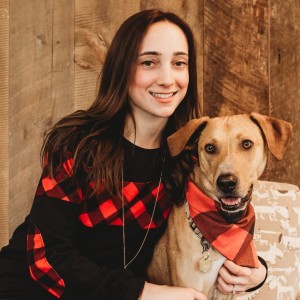
Danielle Vrabel, CPDT-KA
Danielle Vrabel is a dog trainer who earned her CPDT-KA in 2020. Danielle is a proud pet mom of five pets: two dogs, two cats, and a corn snake. Danielle has fostered over ten dogs and fifteen cats and kittens, as well as helped train shelter dogs before they are adopted. Both of Danielle’s dogs are pet therapy dogs, where she also volunteers her time helping evaluate future therapy dogs.
Related articles
![Happy golden retriever dog on a walk with owner in woodsy yellow and orange fall setting with leaves on the dirt trail.]()
Home Remedies for Dog Joint Pain Relief
DIY ways to help your pup cope with the pain.
![Woman lying in bed with two golden retrievers]()
13 Reasons You Should Let Your Dog Sleep in Your Bed
It’s science (and adorable).
![a dog and human in a giant dog bed on the floor]()
5 Human Dog Beds for the Coziest Among Us
Finally, there’s a product for anyone who’s ever wondered how their dog can do nothing but sleep all day.
![Sad boxer rests on owners lap, dog doesn't want to be touched]()
How to Tell if Your Dog Is in Pain
And what to do to help them.
![Labrador Retriever and Dachsund playing with a stick at the beach shoreline]()
Summer Is Heating Up. Here Are 6 Ways to Keep Your Dog From Doing the Same
Pro tips to keep your pup safe, happy, and exercised during the warmer months.
![a human petting a dog on a dog bed]()
The Best Dog Beds Of 2026
Our dogs sleep with us, too. But these trainer-recommended dog beds—from indestructible ones for puppies to orthopedic options for seniors—are the next best thing.

